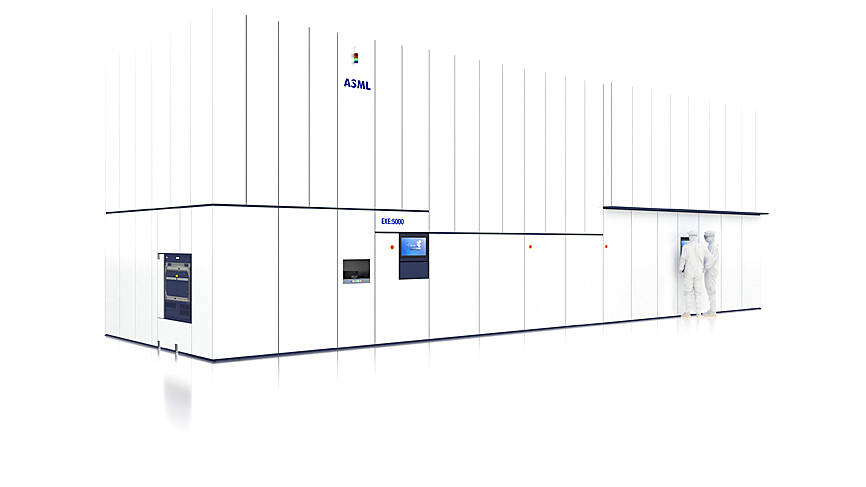ASML Holding NV gave a bullish revenue outlook, citing strong demand for its machines that make advanced semiconductors and said it would buy back 12 billion euros (US$12.2 billion) of its own stock.
The Dutch chip production equipment supplier said growth in semiconductor markets and the need for more advanced production would drive demand for its products and services, resulting in annual revenue of as much as 40 billion euros by 2025. That compares with an average analyst estimate of 32 billion euros.
ASML’s confidence in longer-term growth comes amid a sharp downturn in demand for its customers’ products that is causing many of them to rein in their spending on new plants and equipment.

Photo: Reuters
The Dutch company said increasing competition in outsourced chipmaking and efforts in Europe and the US to nurture domestic production are contributing to the industry’s need to add more capacity.
ASML’s buyback program is to run through 2025, it said in a regulatory filing on Thursday.
The company will use about 2 million shares to cover employee plans and cancel the remainder.
ASML’s bullishness about the future is growing. Last year, it had predicted sales would be between 24 billion euros and 30 billion euros by 2025. That target is now 30 billion euros to 40 billion euros, it said in the filing.
By 2030, revenue would expand further to as much as 60 billion euros, it said.
“While the current macroenvironment creates near-term uncertainties, we expect longer-term demand and capacity showing healthy growth,” the company said.
In line with its projection of increasing demand, the company is raising output to 90 of its extreme ultraviolet lithography machines and 600 deep-ultraviolet machines by 2025 to 2026.
ASML’s gear performs the crucial function of burning patterns into materials deposited on wafers off silicon that make up the circuits that give chips their function.
Even though the global chip industry is now facing a severe downturn, countries including the US and Japan have not slowed their pace in readying new plants to prepare for the next boom cycle.
Taiwan Semiconductor Manufacturing Co (台積電) is even now considering adding another advanced facility next to a US$12 billion plant that is under construction in the US state of Arizona.
ASML has not been able to sell its most advanced extreme ultraviolet lithography machines to China, as the Dutch government refused to give it a license to do so, but it has been able to sell its other machinery to the country.
ASML sees the total impact from the new US measures to be about 5% of its backlog, it said on a call with investors last month.

SEEKING CLARITY: Washington should not adopt measures that create uncertainties for ‘existing semiconductor investments,’ TSMC said referring to its US$165 billion in the US Taiwan Semiconductor Manufacturing Co (TSMC, 台積電) told the US that any future tariffs on Taiwanese semiconductors could reduce demand for chips and derail its pledge to increase its investment in Arizona. “New import restrictions could jeopardize current US leadership in the competitive technology industry and create uncertainties for many committed semiconductor capital projects in the US, including TSMC Arizona’s significant investment plan in Phoenix,” the chipmaker wrote in a letter to the US Department of Commerce. TSMC issued the warning in response to a solicitation for comments by the department on a possible tariff on semiconductor imports by US President Donald Trump’s

The government has launched a three-pronged strategy to attract local and international talent, aiming to position Taiwan as a new global hub following Nvidia Corp’s announcement that it has chosen Taipei as the site of its Taiwan headquarters. Nvidia cofounder and CEO Jensen Huang (黃仁勳) on Monday last week announced during his keynote speech at the Computex trade show in Taipei that the Nvidia Constellation, the company’s planned Taiwan headquarters, would be located in the Beitou-Shilin Technology Park (北投士林科技園區) in Taipei. Huang’s decision to establish a base in Taiwan is “primarily due to Taiwan’s talent pool and its strength in the semiconductor

An earnings report from semiconductor giant and artificial intelligence (AI) bellwether Nvidia Corp takes center stage for Wall Street this week, as stocks hit a speed bump of worries over US federal deficits driving up Treasury yields. US equities pulled back last week after a torrid rally, as investors turned their attention to tax and spending legislation poised to swell the US government’s US$36 trillion in debt. Long-dated US Treasury yields rose amid the fiscal worries, with the 30-year yield topping 5 percent and hitting its highest level since late 2023. Stocks were dealt another blow on Friday when US President Donald

UNCERTAINTY: Investors remain worried that trade negotiations with Washington could go poorly, given Trump’s inconsistency on tariffs in his second term, experts said The consumer confidence index this month fell for a ninth consecutive month to its lowest level in 13 months, as global trade uncertainties and tariff risks cloud Taiwan’s economic outlook, a survey released yesterday by National Central University found. The biggest decline came from the timing for stock investments, which plunged 11.82 points to 26.82, underscoring bleak investor confidence, it said. “Although the TAIEX reclaimed the 21,000-point mark after the US and China agreed to bury the hatchet for 90 days, investors remain worried that the situation would turn sour later,” said Dachrahn Wu (吳大任), director of the university’s Research Center for